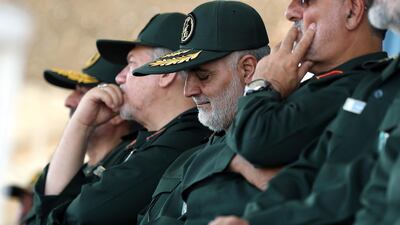Representatives of Iran’s Quds Force and Muslim Brotherhood considered forming an alliance against Saudi Arabia in 2014, leaked Iranian documents published on Monday show.
The 700 pages of files from Iran's Ministry of Intelligence and Security, seen by The New York Times and The Intercept, showed Tehran wielding its influence in the region, especially in Iraq.
Representatives of the Quds Force, the foreign operations arm of Iran's Islamic Revolutionary Guard, and the Brotherhood held secret summit at a Turkish hotel in April 2014 to seek common ground.
Although they had major differences, during the meeting they decided there “should be a focus on joint grounds for co-operation”, the documents said.
Both sides shared “a hatred for Saudi Arabia, a common enemy of the Muslim Brotherhood and Iran”.
Representatives of the Brotherhood suggested the two should join forces against the Saudis.
The place to do that was in Yemen, where a war between the Iranian-backed Houthi rebels and the Saudi-backed Yemeni government was about to escalate.
“In Yemen, with the influence of Iran on the Houthis and the influence of the Brotherhood on the armed tribal Sunni factions, there should be a joint effort to decrease the conflict between Houthis and Sunni tribes to be able to use their strength against Saudi Arabia,” the Brotherhood delegation said.
The documents showed that neither side knew there was a spy at the meeting.
The Iranian ministry, a rival of the Revolutionary Guard in Iran's security apparatus, had an agent who reported on the developments at the meeting.
The ministry agent “acted as co-ordinator of this meeting”, the documents showed.
Iran's intelligence ministry "envied the Quds' power and tried to keep track of their activities around the world".
Turkey at the time had good relations with both sides, making it safe to conduct the meeting there.
But the government denied entry to the Quds Force chief Gen Qassem Suleimani, the documents said.
Other senior Quds officials attended the meeting, which was led by one of Gen Suleimani’s deputies, identified as Abu Hussain.
The Brotherhood delegation was led by three prominent members: Ibrahim Munir Mustafa, Mahmoud El Abiary and Youssef Moustafa Nada.
Mr Nada denied any knowledge of the 2014 meeting in an interview with The Intercept.
After 9/11, the US administration of George W Bush and the UN suspected that Mr Nada helped to finance Al Qaeda. His bank accounts were frozen and his movement restricted.
UN sanctions against him were lifted in 2009 because no proof of his ties to terrorism could be found.


